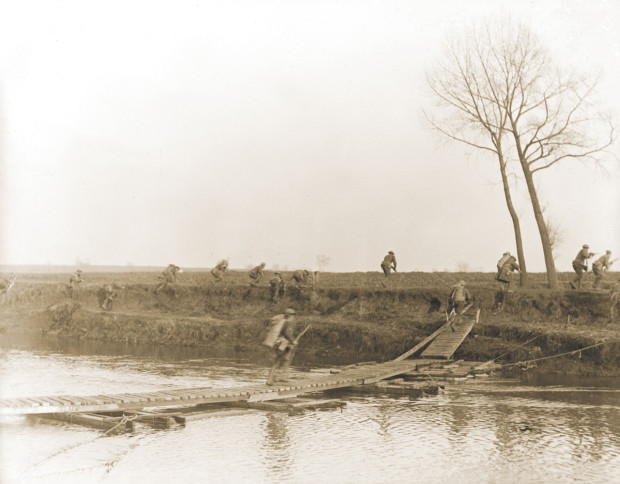
Soldiers of the 146th Infantry, 37th Division, crossing the Scheldt River at Nederzwalm under fire. Image courtesy of The National Archives.
One of the most famous symbols of the sacrifice and loss we mark on Memorial Day and Veterans Day is the Poppy, inspired by this World War I poem, “In Flanders Fields,” written by John McCrae.
John McCrae, a Canadian doctor and teacher who is best known for his memorial poem “In Flanders Fields,”
In Flanders fields the poppies blow
Between the crosses, row on row,
That mark our place, and in the sky,
The larks, still bravely singing, fly,
Scarce heard amid the guns below.We are the dead; short days ago
We lived, felt dawn, saw sunset glow,
Loved and were loved, and now we lie
In Flanders fields.Take up our quarrel with the foe!
To you from failing hands we throw
The torch; be yours to hold it high!
If ye break faith with us who die
We shall not sleep, though poppies grow
In Flanders fields.
Source: The poem is in the public domain courtesy of Poets.org
“Soon after writing “In Flanders Field,” McCrae was transferred to a hospital in France, where he was named the chief of medical services. Saddened and disillusioned by the war, McCrae found respite in writing letters and poetry, and wrote his final poem, “The Anxious Dead.”
In the summer of 1917, McCrae’s health took a turn, and he began suffering from severe asthma attacks and bronchitis. McCrae died of pneumonia and meningitis on January 28, 1918.” (Poets.org)
Inspired by McCrae’s poem, an American woman, Moina Michael originated the idea of wearing red poppies to honor the war dead. She sold poppies with the money going to benefit servicemen, and the movement caught on, spreading to Europe as well. In 1948, Moina Michael was honored for founding the Poppy Movement with a red 3 cent postage stamp.